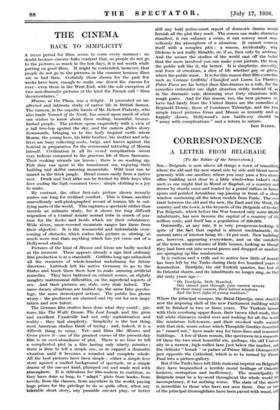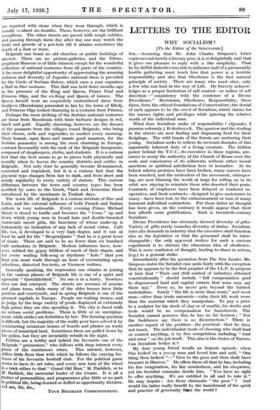CORRESPONDENCE
A LETTER FROM BELGRADE
[To the Editor of the SPECTATOR.] Sin,—Belgrade is now above all things a town of transition, where the old and the new stand side by side and blend incon• gruously with one another, where you may pass a five storey office building next door to a little windowless baker's stall such as one might find in Mosul or Bagdad, or a country cart drawn by sturdy oxen and tended by a genial ruffian in home.
spuns and pointed Astrakhan cap passing in front of a shop. window containing all the latest models from Paris. The con.
trust between the old and the new, the East and the West, the country and the town, is the keynote of the Belgrade of to-day. For Belgrade, which before the War boasted only some 80,000 inhabitants, has now become the capital of a country of l3i million souls, and itself has a population of 200,000.
Outwardly, at any rate, it is very prosperous-looking, in spite of the fact that capital is almost unobtainable, the current rates of interest being 10-15 per cent. New buildings are, however, appearing everywhere, and on the outskirts of the town whole colonies of little houses, looking as though
they had been cut into several pieces and dropped at random, are springing up like mushrooms.
It is curious and a trifle sad to notice how little of beauty has been left by the Turks during their five. hundred years of
domination. Dordjola, the old Turkish quarter, has lost all its Oriental charm, and its inhabitants no longer sing, as they did sixty years ago :— " Oh Dordjola, little Stambul, One cannot pass through your narrow streets For their many corners, their lattice windows And the love sighs of young maidens."
Where the principal mosque, the Batal-Djamija, once stood is now the imposing shell of the new Parliament building which will be finished in two or three years. The Turkish houses with their overhung upper floors, their brown tiled roofs, their tall white chimneys roofed over and looking for all the world like miniature bell-towers, and their crooked walls washed with that rich, warm colour which Theophile Gautier described as " canard roti," have made way for tram-lines and tenement buildings. A few of them remain, like specimens in a museum.
Of these the two most beautiful are, perhaps, the old Univer- sity in a narrow, high-walled lane just below the market, and the delicate " konak " or palace of Prince Milosh Obrenoviteb just opposite the Cathedral, which is to be turned by Prime Paul into a picture-gallery.
But if the Turks have left little material imprint on Belgrade,
they have bequeathed a terrible moral heritage of Oriental laziness, corruption and inefficiency. The municipality of Belgrade must be a by-word throughout the whole world for incompetency, if for nothing worse. The state of the streets is incredible to those who have not seen them. One or two of the principal thoroughfares have been paved with wood, and are repaired with stone when. they wear through, which is usually in about six months. These, however, are the brilliant exceptions. The other streets are paved with rough cobbles, and passing through them day after day one may watch the birth and growth of a pot-hole till it attains sometimes the depth of a foot or more.
Belgrade can boast no old churches or public buildings of interest. There are no picture-galleries, and the Ethno- graphical Museum is of little interest except for the wonderful collection of national costumes from all parts of the country. A far more delightful opportunity of appreciating the amazing richness and diversity of Jugoslav national dress is provided by the Circle of Serbian Sisters, which once a year organizes a Ball in Slav costume. This Ball was held three months ago in the presence of the King and Queen, Prince Paul and Princess Olga, and the ex-King and Queen of Greece. The Queen herself wore an exquisitely embroidered dress from Smiljevo (Macedonia) presented to her by'the town of Bitolj, and Princess Olga looked charming in a costume from Prizren.
Perhaps the most striking of the Serbian national costumes are those from Macedonia with their barbaric designs in red, black and gold. Equally charming, however, are the dresses of the peasants from the villages round Belgrade, who bring their cheese, milk and vegetables to market every morning. Their honest, open faces and innate good manners, for the Serbian peasantry is among the most charming in Europe, contrast favourably with the ruck of the Belgrade bourgeoisie, composed of shopkeepers, clerks, and students. It is a curious fact that the Serb seems to go to pieces both physically and morally when he leaves the country districts and settles in Belgrade. Not only does he generally become ill-mannered, coneeited and impudent, but it is a curious fact that the physical type changes from fair to dark, and from short and sturdy regularity to every variety of stature. This curious difference between the town and country types has been ascribed by some to the Greek, Vlach and Armenian blood introduced by the merchants in. Turkish days.
The town life of Belgrade is a curious mixture of Slav and Latin, and the external influence of both French and Italian culture is very noticeable. Every evening Prince Michael Street is closed to traffic and becomes the " Corso " up and down which young men in broad hats and double-breasted waistcoats escort girls, the heaviness of whose make-up is fortunately no indication of any lack of moral virtue. Café life, too, is developed to a very high degree, and it can at least be said for the " Beogradjanin " that he is a great lover of music. There are said to be no fewer than six hundred café orchestras in Belgrade. Modern influences have, how- ever, robbed the gypsy fiddlers of much of their charm, and for every wailing folk-song or rhythmic " kolo " that you hear you must wade through an hour of excruciating opera selections, distorted fox-trots, or Viennese waltzes.
Generally speaking, the impression one obtains in joining in the various phases of Belgrade life is one of a quiet and agreeable " Gemiltlichkeit." No one is in a hurry. Nowhere does one feel cramped. The streets are avenues of acacias and plane trees, while many of the older houses have little gardens and courtyards, and in spring Belgrade is one of the greenest capitals in Europe. People are making money, and to judge by the large variety of goods displayed at extremely high prices they are also spending it. The city is faced with no serious social problems. There is little or no unemploy- ment, while strikes are forbidden by law. The housing question is difficult, but the majority of the really poor have solved it by constructing miniature homes of boards and plaster on waste pieces of municipal land. Sometimes these are pulled down by the police, but they are invariably rebuilt in the night.
Politics are a hobby and indeed the favourite one of the Belgrade" promeneur," who follows with deep interest every phase of the continuous crises. This interest, however, differs little from that with which he follows the varying for- tunes of his favourite football club. For the political game seems to have its set rules, and every new turn of the wheel Is a trick either to that " Grand Old Man," M. Pashitch, or to 4. Raditch, the mercurial leader of the Croats. It is all a Patter of personalities, and programmes play little or no part In political life, being donned or doffed as opportunity dictates.
am, Sir, &v., Youu BELGRADE CORRESPONDENT.











































 Previous page
Previous page